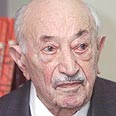
Nazi-hunter Wiesenthal dies
Holocaust survivor Simon Wiesenthal dies in Vienna at age 96. Rabbi: He was conscience of Holocaust. Efforts by man who became symbol of fight against Nazi atrocities helped bring more than 1,000 war criminals to justice; assisted Israel in capturing senior Nazi official Adolf Eichmann
“Simon Wiesenthal was the conscience of the Holocaust,” said Rabbi Marvin Hier, dean and founder of the International Human Rights NGO named in Mr. Wiesenthal’s honor, adding “When the Holocaust ended in 1945 and the whole world went home to forget, he alone remained behind to remember.”
“He did not forget. He became the permanent representative of the victims, determined to bring the perpetrators of the history’s greatest crime to justice,” Hier said. “There was no press conference and no president or Prime Minister or world leader announced his appointment. He just took the job. It was a job no one else wanted.”
‘Great loss to Jewish people'
Israel bows its head in grief over the passing of a great man, Deputy Minister of Social and Diaspora Affairs, Rabbi Michael Melchior (Labor) said in the wake of Wiesenthal's death.
"One of the giants of the Jewish world has died in ripe old age. Wiesenthal was a man who got out of the horrors of the concentration camps to look for justice," Melchior said.
Chairwoman of the Immigration and absorption Committee, MK Colette Avital (Labor) said Wiesenthal's passing is a great loss to the Jewish people.
"Wiesenthal relentlessly pursued Nazi war criminals. He brought them to trial, acting on his strong sense of justice."
Wiesenthal was born on December 31, 1908 in Ukraine. During World War II he was assigned to a forced labor camp, but eventually managed to escape. Following the war, he began gathering evidence on Nazi atrocities on behalf of the War Crimes Section of the American military.
In 1953 Wiesenthal received information that former senior Nazi official Adolf Eichmann was living in Argentina. He relayed the information to the Israeli government, but for some unknown reason, Israel received erroneous information that Eichmann was living in Syria.
It was only in 1959 that Eicmann's presence in Argentina could be verified.
In 1962, Eichmann was abducted by Mossad agents in Buenos Aires, brought to Israel, and tried for crimes against the Jewish people, crimes against humanity, and war crimes. Eichmann was found guilty and executed on May 31, 1962.
Numerous honors
In 1977, Wiesenthal founded the Simon Wiesenthal Center, but today the organization is headquarters in Los Angeles. Using his trademark thoroughness and determination, Wiesenthal gathered every record and piece of evidence related to Nazi war criminals, using his talent for investigation to piece solid cases together.
Avner Shalev, chairman of the Yad Vashem Holocaust museum in Jerusalem, lauded Wiesenthal as a man who tirelessly continued to hunt down former Nazis.
“He acted with determination and stubbornness…until his last days,” Shalev said. “To our regret, some war criminals are still alive, but biology does its thing and their numbers decrease.”
'Mengele - my greatest failure'
Wiesenthal considered his inability to capture the brutal Nazi doctor from the Auschwitz death camp, Josef Mengele, his greatest failure. In an interview to the local magazine "Tel Aviv" a few years ago, Wiesenthal said he worked hard on catching Mengele, but never managed to capture him.
In the interview, he added that "a nation that had lost six million of its people in the Holocaust should have had hundreds of centers like mine, to keep reminding the world of what had happened."
When asked whether the State of Israel had put enough efforts into capturing Nazis, Wiesenthal said that "the State of Israel had and has enough problems to deal with."
In the interview, Wiesenthal also spoke about his work and the difficulties associated with it.
"In some cases, the capture was merely a matter of money, like in the case of the Treblinka death camp Chief Commander, Franz Stangel, who lived in Brazil. The Nazis had a lot of money to spend on their new secret lives and new identities in Brazil, Ecuador, Argentina and all across South America."
"We needed a lot of money to deal with them. It was really a direct relation: When I had a lot of money, I had more success; the less money I had, the less successful I was,” he said.
As a result of Wiesenthal’s efforts, over 1,100 Nazi war criminals were brought to justice. The many honors bestowed upon Wiesenthal include decorations from the Austrian and French resistance movements, the Dutch Freedom Medal, the Luxembourg Freedom Medal, the United Nations League for the Help of Refugees Award, the U.S. Congressional Gold Medal presented to him by President Jimmy Carter in 1980, and the French Legion of Honor which he received in 1986.















